How Often Should HVAC Filters Be Changed
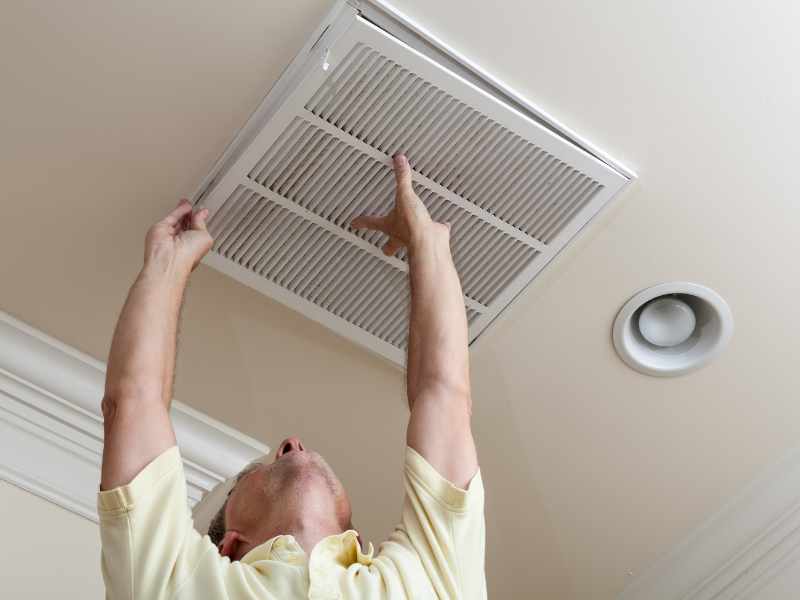
HVAC filters might not capture the imagination like the world of fine spirits, yet they hold an indispensable role in home comfort and air quality. Often overshadowed by more visible HVAC components, these filters are the unsung heroes, ensuring the smooth operation of your heating and cooling system with a simplicity and efficiency that’s easy to overlook. This quiet efficiency marks HVAC filters as crucial in their domain, offering a level of protection and performance that is essential for both the system and the inhabitants of the home.
Key types of filters include Fiberglass, Pleated, and High-Efficiency Particulate Air (HEPA) filters, each known for their specific benefits. Fiberglass filters, for instance, offer a basic level of filtration and are budget-friendly, while Pleated filters provide a greater surface area for trapping particles, and HEPA filters are the gold standard for removing the smallest of contaminants from the air. Delving deeper, each filter type brings its own set of advantages, lifespan, and suitability for different environments and sensitivities.
The following sections will explore these nuances in detail, offering insights into how often HVAC filters should be changed to maintain optimal air quality, system efficiency, and comfort in your home. This exploration will not only illuminate the critical role of HVAC filters but also guide you in selecting the right filter for your needs and lifestyle, ensuring your living environment remains a sanctuary of clean air and comfort.
What is an HVAC filter?
An HVAC filter is a pivotal element within your heating, ventilation, and air conditioning system. Its main role is to trap and remove dust, pollen, and other air pollutants from circulating in your home. This ensures that the air you breathe is clean, contributing to a healthier living environment.
Moreover, it safeguards the HVAC system itself from potential damage by preventing these particles from entering. Filters are available in various types, including Fiberglass, Pleated, and High-Efficiency Particulate Air (HEPA), each tailored to meet specific air quality needs and efficiency standards. Keeping these filters updated through regular changes is essential for maintaining the best air quality and ensuring your system runs smoothly.
Why Changing an HVAC Filter is Crucial?
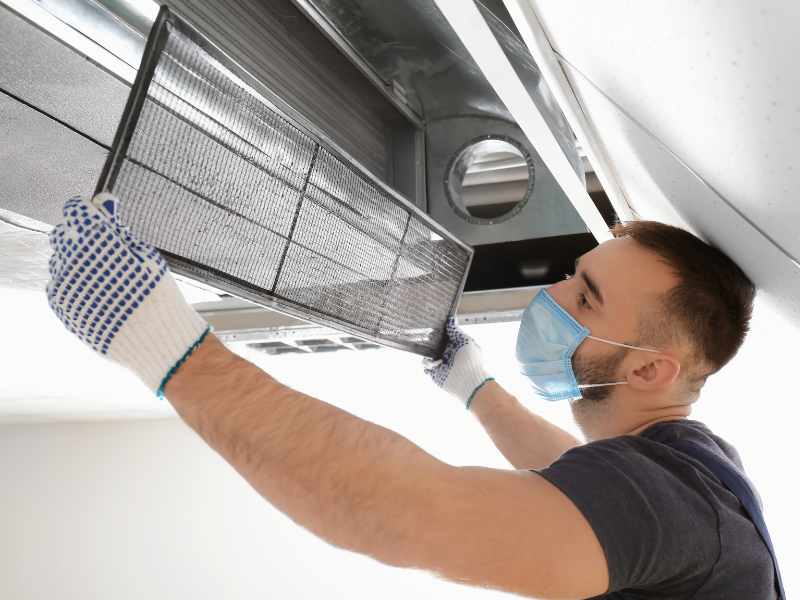
Changing an HVAC filter is crucial for a trio of compelling reasons. Firstly, it maintains indoor air quality, ensuring that the air circulating through your home is clean and free from pollutants and allergens. This is vital for the health and comfort of all occupants, especially those with allergies or respiratory conditions.
Secondly, it ensures efficient HVAC system operation. A clean filter allows your system to run more smoothly, without the added strain of pulling air through a clogged filter, thereby saving energy and reducing wear and tear on the system. Lastly, regular filter changes extend the lifespan of the HVAC system.
By keeping dirt and debris at bay, it minimizes the risk of costly repairs or premature system failure, safeguarding your investment in home comfort.
Maintains indoor air quality
Changing your HVAC filter regularly is key to eliminating dust, pollen, and other pollutants from your home’s air. This action is crucial for creating a healthier living space, particularly for those with allergies or asthma.
Ensures efficient HVAC system operation
A clean filter promotes efficient operation of your HVAC system. It allows air to flow smoothly, reducing the energy required for heating and cooling. This efficiency not only lowers utility bills but also lessens the environmental footprint of your home.
Extends the lifespan of the HVAC system
Regular filter replacements prevent dirt and debris accumulation, safeguarding your system from excess wear. This care avoids expensive repairs and prolongs the life of your HVAC system, ensuring it provides consistent comfort over the years.
Recommended HVAC Filter Change Frequency
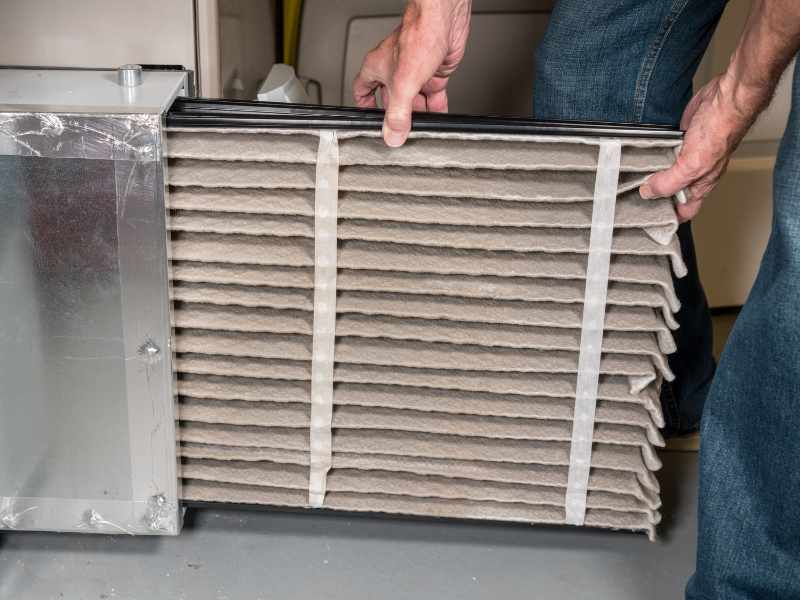
The frequency at which you should change your HVAC filter can vary, depending on the type of filter you are using and your particular living conditions. For standard 1-3 inch filters, it is recommended to replace them every 30-90 days to keep your air quality high and your system running efficiently. Homes with pets or individuals with allergies may need to replace their filters more frequently, approximately every 20-45 days, to effectively manage air pollutants and allergens.
Those using high-efficiency filters might find that changing them every 6-12 months is adequate, thanks to their advanced HVAC filtration capabilities. Considerations such as the overall air quality, presence of pets, allergy considerations, and the frequency of HVAC system use should guide your decision on how often to change your filter, ensuring both a healthy and efficient home environment.
Standard 1-3 inch filters: every 30-90 days
For homes utilizing standard 1-3 inch filters, it’s essential to replace them every 30-90 days. This regular maintenance ensures optimal HVAC performance and clean indoor air quality.
Homes with pets or allergies: more frequently
In environments with pets or residents with allergies, there’s a heightened need for cleaner air, necessitating more frequent filter changes to effectively capture pet dander, fur, and allergens.
Pets: every 20-45 days
For households with pets, it is recommended to change the HVAC filter every 20-45 days. This helps in maintaining a healthy living environment by reducing pet-related air pollutants.
Allergies: every 20-45 days
If allergies are a concern, replacing the filter every 20-45 days can significantly alleviate symptoms by minimizing the presence of allergens in the indoor air.
High-efficiency filters: every 6-12 months
High-efficiency filters offer superior air purification and can therefore be changed less frequently, every 6-12 months. This schedule is ideal for maintaining high air quality without the need for constant replacements.
ALSO READ: How Often Should Commercial HVAC Filters Be Changed?
Factors Affecting Filter Change Frequency
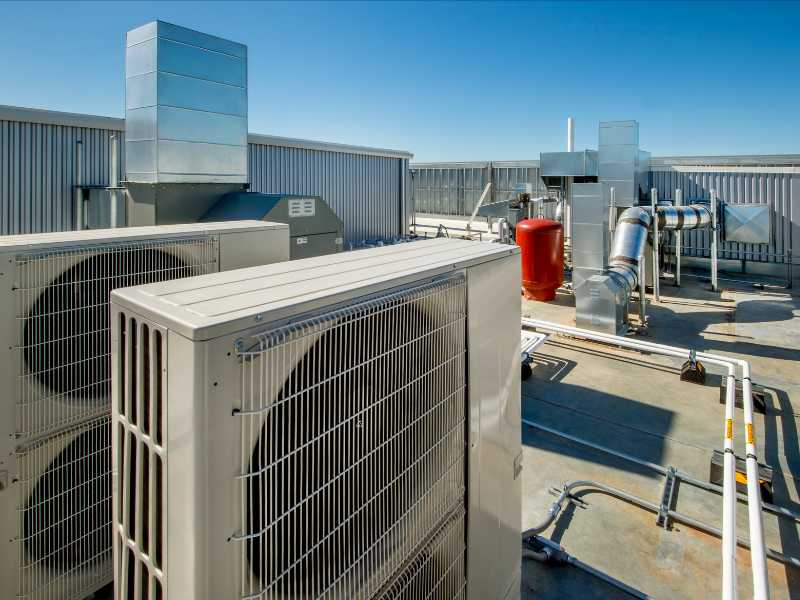
Several variables play a role in determining the optimal frequency for changing your HVAC filter. The type of filter—such as Fiberglass, Pleated, or High-Efficiency—significantly influences the recommended replacement intervals, with some filters designed for longer use than others. Air quality is a crucial consideration; homes in areas with higher levels of pollutants or in urban settings might require more frequent filter changes to maintain clean air.
The presence of pets adds another layer of consideration, as pet dander and fur can clog filters more quickly. For individuals with allergy considerations, the need for clean air can necessitate changing filters more often to reduce allergens in the home environment. Additionally, HVAC system usage fluctuates, with some seasons demanding more from your system, thereby affecting how often the filter should be replaced.
Tailoring your filter change frequency to these factors ensures both the health of your HVAC system and the quality of your indoor air.
Type of filter
The type of filter—ranging from Fiberglass to Pleated or High-Efficiency—significantly dictates the frequency of necessary changes, with high-efficiency options generally lasting longer.
Fiberglass vs. Pleated
Fiberglass filters, while more affordable, may require more frequent replacements compared to Pleated filters, which provide enhanced filtration and a longer lifespan.
Air quality
The surrounding air quality plays a crucial role, with areas facing higher pollution levels necessitating more regular filter changes to ensure clean indoor air quality.
Urban vs. Rural environments
Those in urban environments typically encounter more airborne pollutants than those in rural areas, leading to a greater need for frequent filter replacements.
Presence of pets
The presence of pets in a home increases the need for filter changes due to pet dander and fur, which can quickly clog filters.
Number and type of pets
Both the number and type of pets—especially if they are long-haired—can accelerate the rate at which filters become clogged, requiring more frequent changes.
Allergy considerations
Individuals with allergies may find relief through more frequent filter changes, which can effectively reduce the presence of allergens in the home.
Specific allergen sensitivities
For those with specific allergen sensitivities, adjusting filter change frequency can be crucial in filtering out particular allergens that trigger symptoms.
HVAC system usage
HVAC system usage affects filter lifespan, with periods of heavy use demanding more frequent filter replacements to maintain system efficiency.
Seasonal variations in use
Seasonal variations in system usage—such as increased heating in winter or cooling in summer—can necessitate adjusting the frequency of filter changes to match.
Steps to Change an HVAC Filter
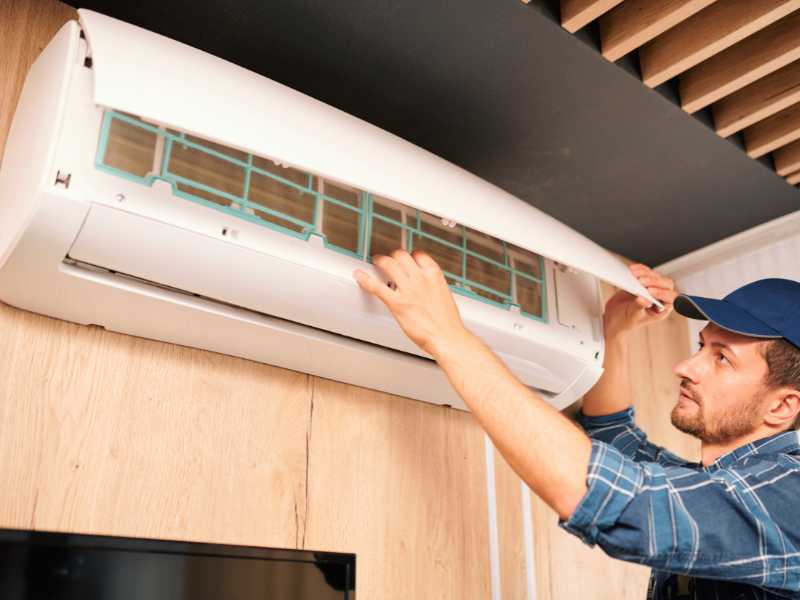
Changing your HVAC filter is an essential maintenance task that enhances your home’s air quality and the efficiency of your system. Begin by locating the filter compartment, commonly found either in the HVAC unit or along a return air duct. Proceed to remove the old filter, carefully sliding it out of its slot.
Note the direction of airflow and the size of the filter to ensure you select a compatible replacement. Finally, insert the new filter correctly, ensuring it’s snugly in place with the airflow arrows aligned towards the blower. Regular adherence to these steps is key to sustaining a clean, efficient, and healthful living environment.
Locate the filter compartment
First, find the filter compartment, usually located either directly in the HVAC unit or within a return air duct. Knowing where this compartment is, is crucial for the filter change process.
Remove the old filter
Gently slide out the old filter from its housing. Take a moment to observe the direction of airflow marked on the filter and examine its condition, which can give insights into your home’s air quality.
Insert the new filter correctly
Place the new filter into the slot, ensuring it’s properly aligned with the airflow arrows pointing towards the blower. A correct fit is essential for maintaining the system’s efficiency and ensuring clean air circulation.
Consequences of Not Changing The HVAC Filter
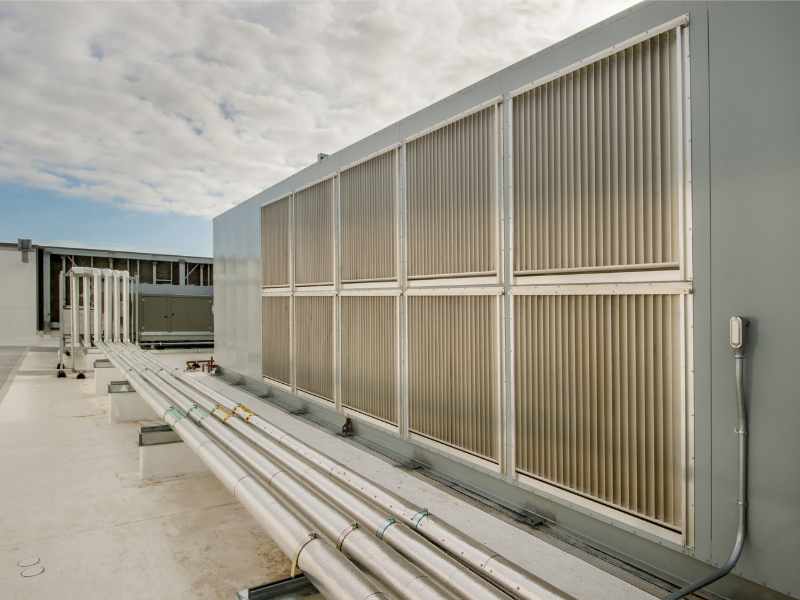
Failing to replace the HVAC filter can lead to significant negative impacts on both the air quality within your home and the performance of the HVAC system. Reduced air quality is a direct consequence, as a saturated filter loses its ability to effectively trap pollutants and allergens, potentially worsening health problems such as allergies or respiratory conditions. Moreover, a clogged filter forces the HVAC system to work harder, which not only increases energy usage but also your utility bills.
Over time, this extra strain can cause premature wear and tear on the system, raising the risk of breakdowns, necessitating expensive repairs, or even leading to total system failure. Regularly changing your HVAC filter is crucial to circumvent these issues, ensuring your indoor air remains clean and your system operates efficiently and durably.
Reduced air quality
Neglecting to replace a clogged HVAC filter directly impacts your home’s ability to maintain clean air, leading to decreased air quality. This can aggravate conditions for individuals with allergies or respiratory issues, making it essential to adhere to regular filter changes.
Increased energy costs
A dirty filter forces the HVAC system to expend more energy to circulate air, resulting in elevated energy consumption and higher utility bills. Regular filter replacements ensure the system operates efficiently, optimizing energy use and reducing costs.
Potential system damage or failure
Continuous operation with a clogged filter puts undue stress on the HVAC system, increasing the risk of premature wear and tear. This added strain can lead to expensive repairs or the need for a complete system overhaul, emphasizing the importance of timely filter changes.
Signs Your HVAC Filter Needs Changing Sooner
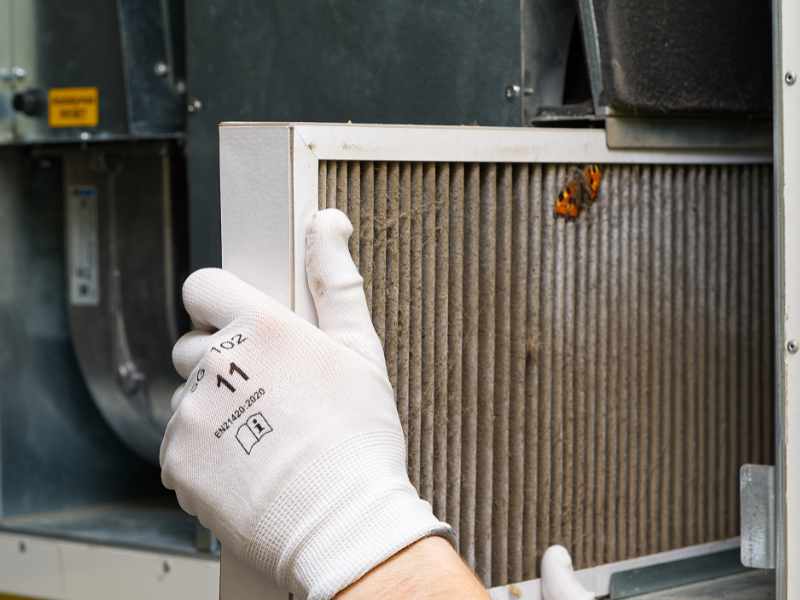
Even with a regular maintenance schedule, there are times when your HVAC filter might need changing sooner than expected. Recognizing these signs can help you maintain better air quality and system efficiency:
1. Increased Allergy Symptoms
If household members begin experiencing heightened allergy symptoms such as sneezing, coughing, or itchy eyes, it may be a sign that your filter is clogged and failing to trap allergens effectively.
2. Unusual Noises from the HVAC System
A clogged filter can cause your HVAC system to work harder, leading to unusual noises like rattling or humming. These sounds can indicate that the system is struggling to push air through a dirty filter.
3. Visible Dust and Debris
When you start noticing more dust on surfaces and in the air, it could mean your HVAC filter is no longer trapping particles efficiently, allowing them to circulate throughout your home.
4. Reduced Airflow
If you feel that airflow from your vents has decreased, it might be due to a clogged filter obstructing the passage of air. This not only affects comfort but also forces the system to work harder, reducing its efficiency.
5. High Energy Bills
A sudden increase in your energy bills without a change in usage patterns can signal that your HVAC system is overworking due to a dirty filter. Replacing the filter can help restore energy efficiency and lower costs.
How HVAC Filters Impact Energy Efficiency Ratings
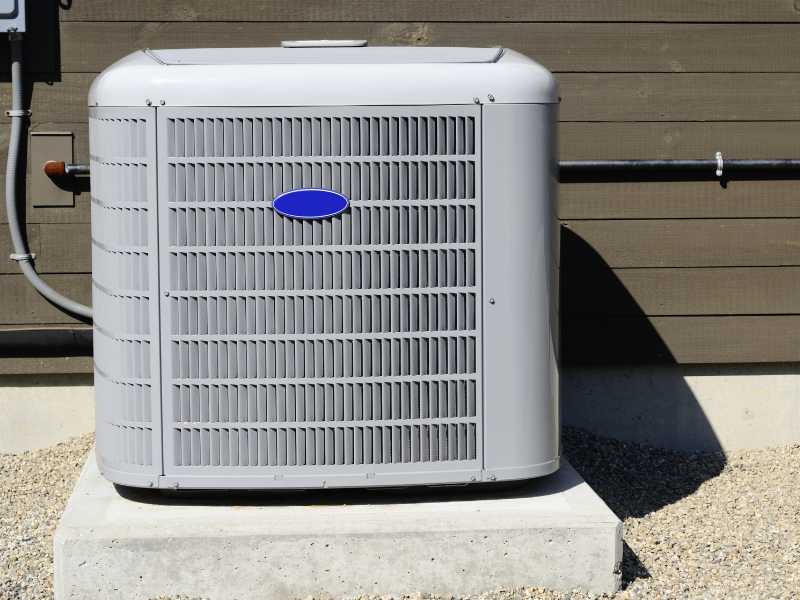
HVAC filters play a crucial role in maintaining the energy efficiency of your heating and cooling system. Understanding this relationship can help you make informed decisions about filter maintenance and replacements:
Facilitating Optimal Airflow
Clean filters ensure that air flows smoothly through your HVAC system. When filters are clogged, the system must work harder to circulate air, consuming more energy and lowering overall efficiency.
Reducing System Strain
A clean filter minimizes the workload on your HVAC system by preventing dust and debris buildup on essential components like the blower motor and coils. This reduces wear and tear, leading to fewer repairs and a longer system lifespan.
Enhancing Heating and Cooling Performance
Efficient filters help maintain consistent indoor temperatures by allowing your HVAC system to operate as designed. This not only improves comfort but also ensures that the system uses energy more effectively.
Lowering Energy Consumption
By keeping filters clean, you can significantly reduce the energy required to heat and cool your home. This contributes to lower utility bills and a smaller carbon footprint, aligning with energy efficiency goals.
Improving SEER and AFUE Ratings
Regular filter maintenance can positively impact the Seasonal Energy Efficiency Ratio (SEER) for cooling systems and the Annual Fuel Utilization Efficiency (AFUE) for heating systems. Higher SEER and AFUE ratings indicate better efficiency, which can lead to energy savings and potentially qualify for rebates or incentives.
ALSO READ: The Most Energy-Efficient HVAC Systems
Smart Home Technology and HVAC Filter Monitoring
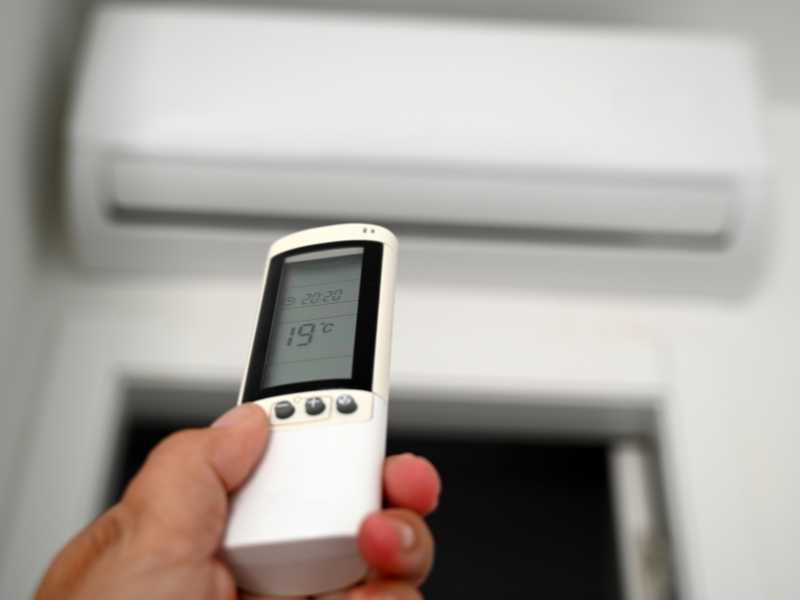
Incorporating smart home technology into your HVAC system can revolutionize how you monitor and maintain your filters, ensuring optimal performance and air quality with minimal effort. Here’s how smart home advancements are transforming HVAC filter management:
Real-Time Monitoring and Alerts
Smart HVAC systems can provide real-time monitoring of your filter’s condition. Equipped with sensors, air quality monitors can detect when a filter is becoming clogged and send you alerts via your smartphone or home automation hub, prompting timely replacements.
Integration with Smart Home Ecosystems
Modern HVAC systems can integrate seamlessly with your existing smart home ecosystem. By connecting to platforms like Google Home, Amazon Alexa, or Apple HomeKit, you can receive voice notifications and integrate filter maintenance reminders into your daily routine.
Automated Air Quality Assessments
Advanced HVAC systems can continuously assess indoor air quality. If pollutants or allergens reach a certain threshold, the system can automatically notify you to check or change the filter, ensuring that your home’s air remains clean and healthy.
Predictive Maintenance Features
Some smart HVAC systems offer predictive maintenance capabilities. By analyzing usage patterns, environmental factors, and historical data, these systems can predict when your filter will need replacement, allowing you to proactively manage filter changes before issues arise.
Enhanced Energy Efficiency
Smart technology not only monitors filter status but also optimizes system performance based on filter condition. By adjusting operation settings in response to real-time data, your HVAC system can maintain high energy efficiency, even as the filter accumulates particles, leading to lower energy consumption and cost savings.
User-Friendly Apps and Interfaces
Smart HVAC systems typically come with user-friendly apps and interfaces that make it easy to track filter status, schedule maintenance, and receive reminders. These tools provide valuable insights and simplify the process of keeping your HVAC system in top condition.
In Summary
Regularly changing your HVAC filters is a simple yet critical maintenance task that significantly impacts your home’s air quality, system efficiency, and overall comfort. The frequency of filter changes depends on various factors, including the type of filter, air quality, presence of pets, allergy considerations, and HVAC system usage. By understanding and adhering to the recommended guidelines for filter replacement, you can ensure a healthier living environment, optimize your system’s performance, and extend its lifespan.
Remember, neglecting to change your HVAC filter can lead to decreased air quality, increased energy costs, and potential system damage or failure. Taking the time to regularly check and replace your filters not only protects your HVAC system but also promotes better indoor air quality, contributing to the well-being of your household. Keep your home a sanctuary of clean air and comfort by staying on top of this essential maintenance task.
Experience top-of-the-line HVAC services with Callidus Air. From HVAC installation to repair, our expert team ensures your heating and cooling systems run efficiently all year round. Don’t wait—contact Callidus Air now and elevate your home comfort to the next level!
